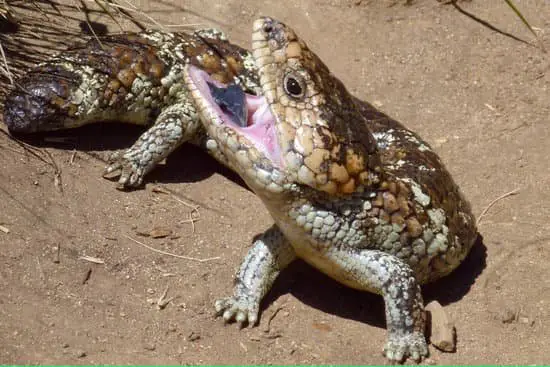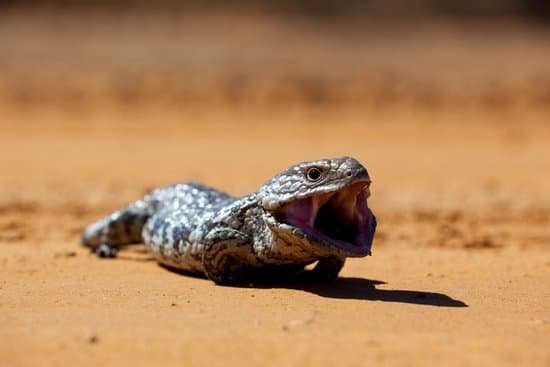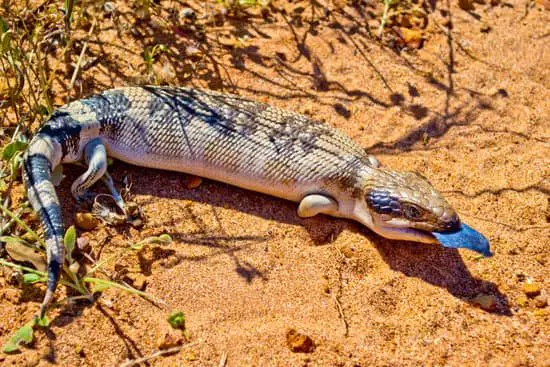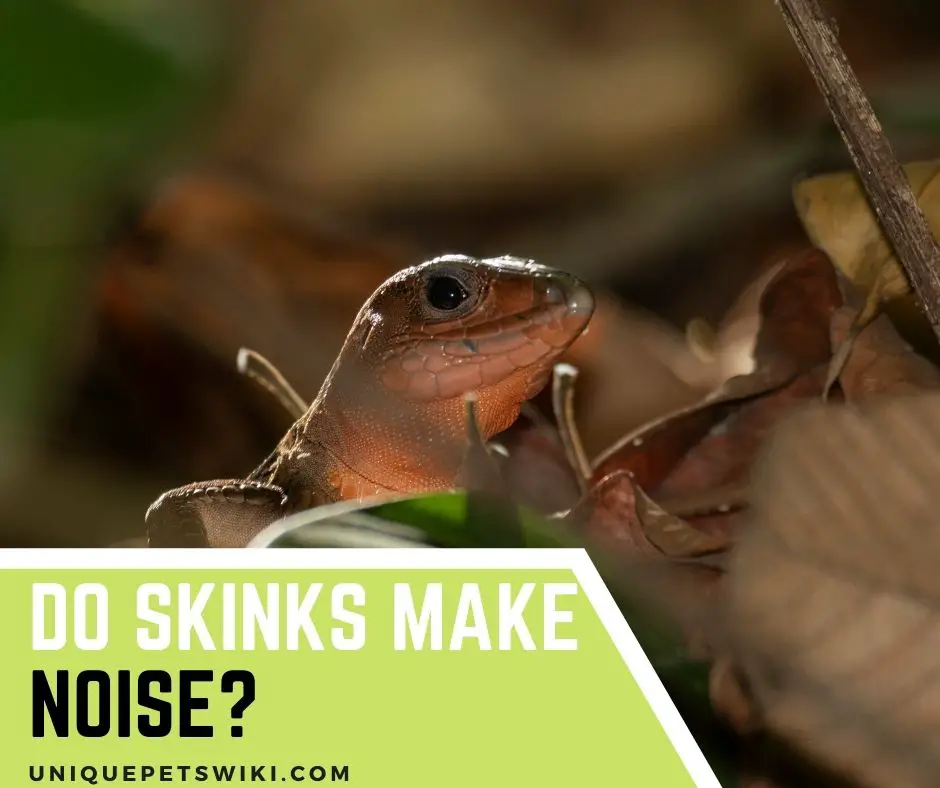The majority of lizards do not make a sound all the time, however, they do when they feel the need to express or communicate. They can make sounds, for example, squeaking, whistling, grunting, clicking, hissing, and wheezing. Owners may be surprised or wondering what the different sounds could be and what they could mean.
This article contains basic information on the sounds commonly made by skinks.
Contents
Do Skinks Make Noise?
Yes, skinks make noise. As first-time owners, you may be stunned by the sounds they are making. These would pique your interest as these could have a variety of indications. You will be able to tell their condition or problem by merely listening to the frequency, level, and volume.
Some sounds can also be difficult to make out, and as caretakers of skinks, it is extremely important to understand them.
If your skink is whistling or squeaking, be sure to let it do so. Your little guy might just want some peace and quiet.
Your pet can also whistle or exhale when it has small particles of loose soil in its nose. This is because the animal burrows to eat and then returns back up from beneath ground without fully expelling all that dirt, sand grains which end up getting stuck. Make sure you use shavings that are not very fine to keep dust at bay.
Your skink is most likely uncomfortable and wants you to stop if you hear it grunting. In the event that he does, it means exactly what’s on its mind – leave me alone.

5 Sounds Skinks Make And Their Meanings
Nearly all of the reptiles and amphibians in the world have a larynx with a couple of vocal cords. This allows them, including skinks, to make any sound. Lizards usually open their mouth, inflate, and then deflate.
When they deflate, they exhale air from their mouth, commonly when they feel excited, and thus, a sound comes out. That is the principal sound-producing mechanism in such animals. Skinks can whistle or squeak, grunt or hiss, and click.
Whistling Or Squeaking
When you hear a high-pitched sound coming from your pet, a whistle, or squeak, this could have many underlying reasons. Those that make this sound appear reserved and contented. However, this could be a message cautioning you to leave it alone.
Perhaps, it does not like to be handled or disturbed. It may be feeling uneasy, but fret not, as this is only temporary and could easily be alleviated.
Furthermore, if your skink has little dusty particles of the loose bedding material inside its nose, it may be whistling or exhaling. This also frequently happens when it burrows inside its enclosure, enabled by the substrate used.
As the owner, the main caretaker, you must ensure that the bedding is comfortable, not too fine, and not too dusty. Instead of using shavings or chips, you may consider using aspen or coconut chips.
Furthermore, when communicating anywhere around your skink, you can drop your volume to a whispering level to drown out noises from appliances and other equipment. Unfortunately, we frequently forget that normal speaking levels might make them feel frustrated, overwhelmed, hostile, or even afraid.
Careful handling should concentrate on just allowing your pet skink to rest in your hands for a few seconds. You will notice that they cease tensing their muscles and progressively relax down as they begin to understand that you intend no harm as they sit on your palm.

Grunting Or Hissing
A low, short guttural sound comes out when your skink is grunting. This could mean that it is feeling stressed or uneasy. You can hear a sharp sound when it hisses. Similar to grunting, it means that it is feeling uncomfortable with its current situation or handling.
This often happens when the skink is still new to its environment. It may still be adjusting even after two or three months. If this is the case, you will also notice other signs such as body enlargement, open mouth, and biting.
Another reason could be it is trying to let out loose substrate from its nose. It could have inhaled some so they intend to get rid of it.
In this case, grunting or hissing may happen from the burrowing activity inside the enclosure and is enabled by the type of substrate used. If not substrate, it may have a piece of skin inserted inside that is difficult to breathe out.
Your skink would normally stop with these sounds when you deal with what is causing distress or trouble. Not responding to the grunting or hissing could result in aggressive behavior or more stress.
For owners, you may consider changing their substrate if they consistently grunt or hiss, if the substrate is confirmed to be the cause. Inspect their nostrils to see if they have anything that needs to be removed. Determine what could be stressing them that induces them to grunt or hiss.
Squeaky Noises
Squeaky noises from your blue tongue skink are also possible. Squeaky noises are usually nothing to be concerned about and are caused by minute particles lodged within the nostrils.
This may also be due to stress from something bothering them. When this happens, the pet owners normally determine what the cause is. Then, they try to tame them down.
Look into their nostrils to see what may be causing the squeaky noises. If the substrate is verified to be the source of the sound, owners should consider altering or adjusting their substrate.
The new one could be something that is not easy to inhale or ingest but is still functional and comfortable.
When the skink is new and adjusting to the environment, it is critical to hold them like you would a newborn, otherwise, they will develop increasingly fearful of humans as they grow older.
Sitting in front of their enclosure every day and talking to them, without attempting to pet them, could get them used to you. The more time you spend demonstrates that you are not a threat.
Clicking
Clicking noises might sometimes indicate a posing or present respiratory problem in your pet skink. Minor clicking noises, on the other hand, might be caused by substrate caught in your blue tongue’s nostrils.
The clicking noise is a common concern in skink owners. When the skink breathes, it might make this sound due to a respiratory ailment. Skinks may create a variety of strange tiny noises when they inhale and exhale.
You have to examine other signs or symptoms such as their condition in the enclosure, physical appearance, and behavior. If you notice crusty eyes or nose, lethargy, or loss of appetite alongside the clicking noises, it may be problematic.
You may closely observe your skink spot other signs or symptoms. Make sure not to alarm or bother your pet when doing so to avoid stress. Take your blue tongue skink to the vet for a consultation or examination in this circumstance.
To assist your blue tongue, raise the tank temperature in its basking place by 10 degrees (about 3 degrees Celsius). If there is a suspicion of a more serious health issue, consult a vet. Respiratory infections should not be neglected and must be treated right away.

Huff
A huff is a loud blow. When you first notice a blue-tongue skink huff, it may be pretty alarming, especially if you are not familiar with how these lizards normally act. Most owners feel threatened or afraid of biting when this happens.
Aggression can further when the problem is not immediately determined. They huff when they do not feel comfortable or pleasant, possibly from handling or given their circumstances or current condition in their enclosure.
Skinks are not social animals, so it can take time for them to get used to being handled by humans. They also might feel overwhelmed and threatened in loud or rough environments- which means owners need to slow down when handling skinks.
To prevent these feelings from happening we recommend approaching your new pet slowly with gentle hands, as well keep interactions quiet at first until the animal gets more comfortable around you.
FAQs
What does a blue-tailed skink sound like?
While blue-tailed skinks can be quiet most of the time, they can make a sound just like any other animal. They click, squeak, wheeze, whistle, and grunt or hiss.
Do King’s skinks make noise?
Yes, King’s skink, another specific species of lizards, can make noise to express or communicate.
Do skinks stink?
Generally, they do not smell. Their excrements are the ones that may stink. There is no residual odor after removing the excrement from the enclosure.
Because they cannot clean up after themselves and are confined to an enclosure, they will naturally smell. However, it is ideal for them not to develop any foul smell.
You will have no odors if you spot clean every day and conduct a comprehensive clean once a month. For convenience, it is much more simple to use toilet paper and safely discard it.
Last Sentences
Skinks require time and effort to become accustomed to being handled by humans because they are not naturally gregarious creatures.
Such sounds can also be caused by loud noises and hard handling, since they may feel overwhelmed and even frightened.
Owners must approach them cautiously, handle them softly, and do it in a peaceful atmosphere to avoid this.
We hope you have learned something new about these amazing creatures and are inspired to learn more.
